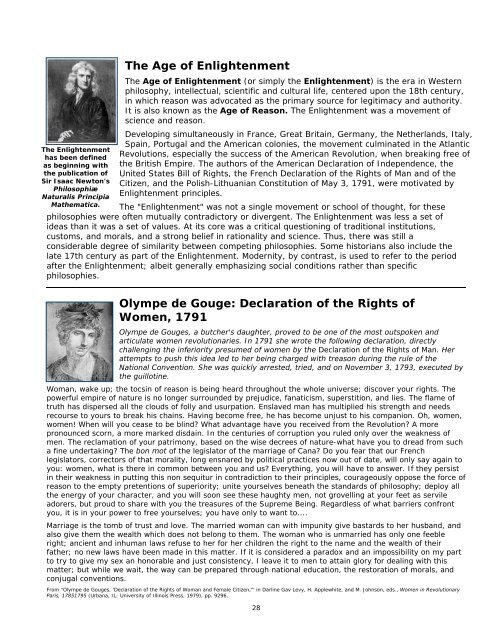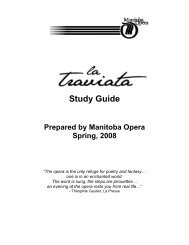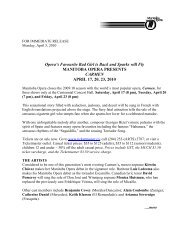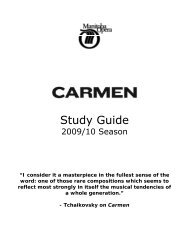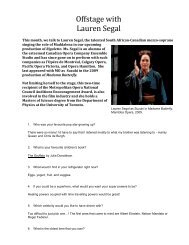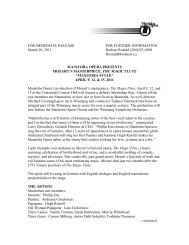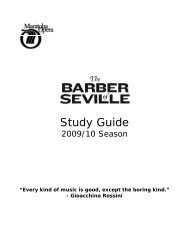The Magic Flute Study Guide - Manitoba Opera
The Magic Flute Study Guide - Manitoba Opera
The Magic Flute Study Guide - Manitoba Opera
Create successful ePaper yourself
Turn your PDF publications into a flip-book with our unique Google optimized e-Paper software.
<strong>The</strong> Enlightenment<br />
has been defined<br />
as beginning with<br />
the publication of<br />
Sir Isaac Newton's<br />
Philosophiæ<br />
Naturalis Principia<br />
Mathematica.<br />
<strong>The</strong> Age of Enlightenment<br />
<strong>The</strong> Age of Enlightenment (or simply the Enlightenment) is the era in Western<br />
philosophy, intellectual, scientific and cultural life, centered upon the 18th century,<br />
in which reason was advocated as the primary source for legitimacy and authority.<br />
It is also known as the Age of Reason. <strong>The</strong> Enlightenment was a movement of<br />
science and reason.<br />
Developing simultaneously in France, Great Britain, Germany, the Netherlands, Italy,<br />
Spain, Portugal and the American colonies, the movement culminated in the Atlantic<br />
Revolutions, especially the success of the American Revolution, when breaking free of<br />
the British Empire. <strong>The</strong> authors of the American Declaration of Independence, the<br />
United States Bill of Rights, the French Declaration of the Rights of Man and of the<br />
Citizen, and the Polish-Lithuanian Constitution of May 3, 1791, were motivated by<br />
Enlightenment principles.<br />
<strong>The</strong> "Enlightenment" was not a single movement or school of thought, for these<br />
philosophies were often mutually contradictory or divergent. <strong>The</strong> Enlightenment was less a set of<br />
ideas than it was a set of values. At its core was a critical questioning of traditional institutions,<br />
customs, and morals, and a strong belief in rationality and science. Thus, there was still a<br />
considerable degree of similarity between competing philosophies. Some historians also include the<br />
late 17th century as part of the Enlightenment. Modernity, by contrast, is used to refer to the period<br />
after the Enlightenment; albeit generally emphasizing social conditions rather than specific<br />
philosophies.<br />
Olympe de Gouge: Declaration of the Rights of<br />
Women, 1791<br />
Olympe de Gouges, a butcher's daughter, proved to be one of the most outspoken and<br />
articulate women revolutionaries. In 1791 she wrote the following declaration, directly<br />
challenging the inferiority presumed of women by the Declaration of the Rights of Man. Her<br />
attempts to push this idea led to her being charged with treason during the rule of the<br />
National Convention. She was quickly arrested, tried, and on November 3, 1793, executed by<br />
the guillotine.<br />
Woman, wake up; the tocsin of reason is being heard throughout the whole universe; discover your rights. <strong>The</strong><br />
powerful empire of nature is no longer surrounded by prejudice, fanaticism, superstition, and lies. <strong>The</strong> flame of<br />
truth has dispersed all the clouds of folly and usurpation. Enslaved man has multiplied his strength and needs<br />
recourse to yours to break his chains. Having become free, he has become unjust to his companion. Oh, women,<br />
women! When will you cease to be blind? What advantage have you received from the Revolution? A more<br />
pronounced scorn, a more marked disdain. In the centuries of corruption you ruled only over the weakness of<br />
men. <strong>The</strong> reclamation of your patrimony, based on the wise decrees of nature-what have you to dread from such<br />
a fine undertaking? <strong>The</strong> bon mot of the legislator of the marriage of Cana? Do you fear that our French<br />
legislators, correctors of that morality, long ensnared by political practices now out of date, will only say again to<br />
you: women, what is there in common between you and us? Everything, you will have to answer. If they persist<br />
in their weakness in putting this non sequitur in contradiction to their principles, courageously oppose the force of<br />
reason to the empty pretentions of superiority; unite yourselves beneath the standards of philosophy; deploy all<br />
the energy of your character, and you will soon see these haughty men, not grovelling at your feet as servile<br />
adorers, but proud to share with you the treasures of the Supreme Being. Regardless of what barriers confront<br />
you, it is in your power to free yourselves; you have only to want to....<br />
Marriage is the tomb of trust and love. <strong>The</strong> married woman can with impunity give bastards to her husband, and<br />
also give them the wealth which does not belong to them. <strong>The</strong> woman who is unmarried has only one feeble<br />
right; ancient and inhuman laws refuse to her for her children the right to the name and the wealth of their<br />
father; no new laws have been made in this matter. If it is considered a paradox and an impossibility on my part<br />
to try to give my sex an honorable and just consistency, I leave it to men to attain glory for dealing with this<br />
matter; but while we wait, the way can be prepared through national education, the restoration of morals, and<br />
conjugal conventions.<br />
From "Olympe de Gouges, 'Declaration of the Rights of Woman and Female Citizen,"' in Darline Gav Levy, H. Applewhite, and M. Johnson, eds., Women in Revolutionary<br />
Paris, 17851795 (Urbana, IL: University of Illinois Press, 1979), pp. 9296.<br />
28


